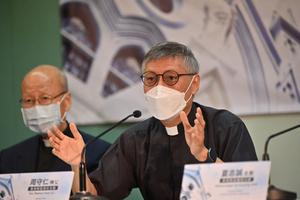Chinese Catholic Exec Arrested in Hong Kong for ‘Collusion With Foreign Powers’
Pro-democracy businessman Jimmy Lai Chee-ying is the first prominent person to be arrested under Communist China’s new national security law.

VATICAN CITY — Hong Kong police today arrested Catholic business tycoon Jimmy Lai Chee-ying under the city’s new national security law — the first high-profile casualty of the controversial ruling that Beijing imposed in June.
A leading pro-democracy activist and a strong critic of Beijing’s human-rights policies, Lai was detained for “collusion with foreign powers,” according to Mark Simon, a senior executive of Next Digital, Lai’s media company that publishes Hong Kong’s Apple Daily newspaper.
Following Lai’s arrest on Monday, hundreds of police were sent to Apple Daily’s offices without a search warrant.
The businessman was one of seven people Hong Kong police apprehended for breaching the city’s new national security law, which punishes what China considers to be subversion, secession, terrorism and collusion with foreign forces.
They could face a maximum sentence of life imprisonment, as well as company fines and prohibitions to stand for public office. Trials could also be heard behind closed doors.
The new security law and other restrictions on civil liberties have alarmed many Western powers.
On Friday, the Trump administration issued sanctions against the leader of Hong Kong’s government, Carrie Lam, and other officials, saying the U.S. “stands with the people of Hong Kong” and would “use our tools and authorities to target those undermining their autonomy.”
As well as severely limiting free expression, critics argue the security law imposes China’s criminal system on Hong Kong, going against the “one country, two systems” policy — the semi-autonomous agreement Beijing made with Hong Kong when the former British colony was returned to China in 1997.
Supporters say the law will bring stability after violent protests against an extradition law Beijing tried but failed to impose on the city last year.
As a result of the new measures, activists have abandoned their organizations, while others have fled the city. Lai, however, has vowed to continue fighting.
This is the first time he has been arrested under the new security law, but he had already been detained and then released in February and April this year for organizing and leading “unauthorized protests.”
Next Digital has also been the target of Beijing’s attempts to drive it into bankruptcy by pressuring Chinese and international firms to cease advertising with Apple Daily. Pro-regime newspapers also regularly attack Lai, and his home and business were firebombed in early 2015.
Although Lai and other Catholics have resisted Beijing’s increasingly authoritarian rule, the Catholic Diocese of Hong Kong has taken a generally cooperative line on the security legislation.
Pope Francis and the Vatican have also remained silent about the increasing curtailment of civil liberties in Hong Kong. The Pope was due to comment on the tensions at an Angelus address last month but made a last-minute decision to omit his remarks.
Some observers believe the reason for the silence is because the Vatican doesn’t want to risk imperiling its secret provisional agreement with Beijing in 2018. Some reports have suggested the Holy See will continue with the accord in September when it comes up for renewal.
Lai’s Fight for Liberty
Given Lai’s activist past, and his consistent defense of civil liberties in Hong Kong, his friends are not surprised by his latest act of resistance.
His “magnanimous life story” is one of an “inspiring synthesis of faith, freedom and entrepreneurship,” said Michael Severance, Rome office director of the Acton Institute, which has been a longtime friend of Lai, a convert to Catholicism. His “gutsy existence and persistent outspokenness,” along with his commercial success, owe themselves to this “sacred ‘trinity’ of values,” Severance told the Register.
Lai appeared in Acton’s 2007 documentary The Call of the Entrepreneur, in which the Asian entrepreneur emotionally recalled in the film how, at age 11, he begged his mother to let him escape Maoist rule, a request she granted.
His mother’s gift of freedom was like “rocket fuel” for Lai, Severance explained, and what has “kept him fighting for true freedom, faith and entrepreneurship for the last several decades in his adopted homeland of Hong Kong.”
“He has greatly suffered at the hands of Beijing’s overreaching authority,” he added.
Writing in May this year after Lai’s earlier arrest, Acton’s research director, Samuel Gregg, said on the basis of Lai’s past and the competitive environment of Hong Kong’s media, he doubted anything would cause Lai to back down. He also pointed out how Lai’s very public presence is a “form of protection for him” in the face of a regime that can often cause people to simply “disappear.”
Lai knows the risks, Gregg wrote, and, moreover, he is fully aware that “being a free man is indeed one of those rare things worth fighting for.”
Edward Pentin is the Register’s Rome correspondent.


















